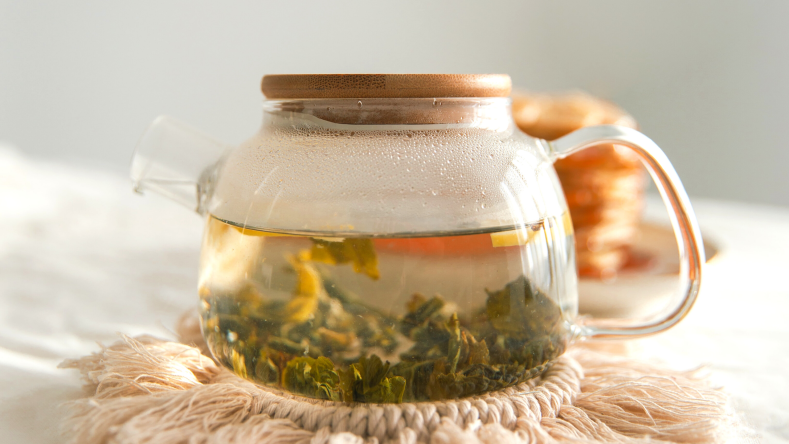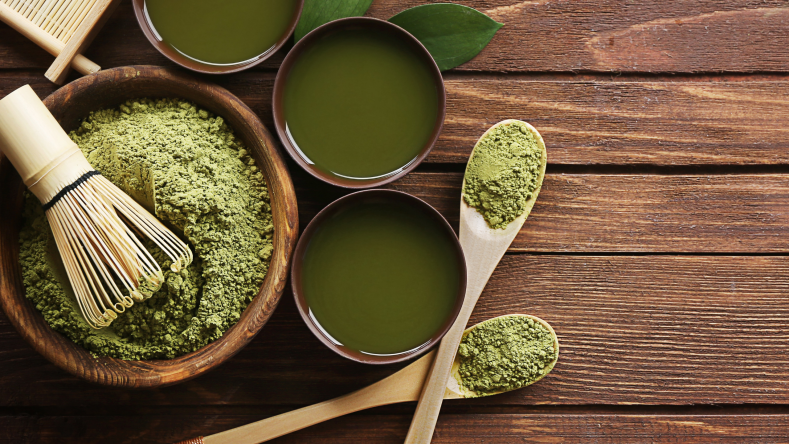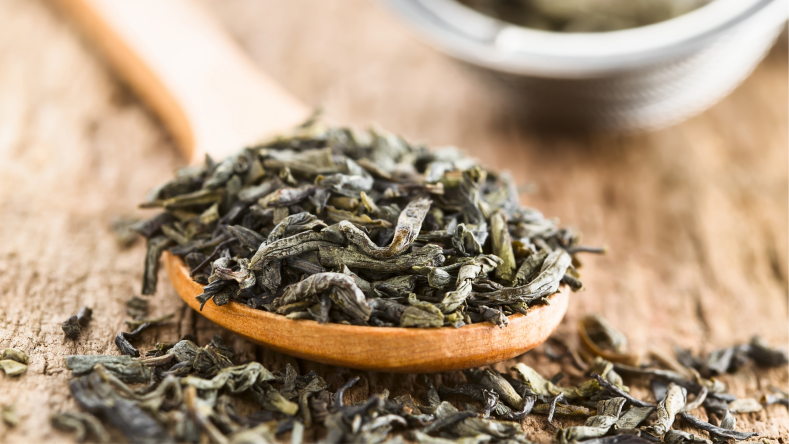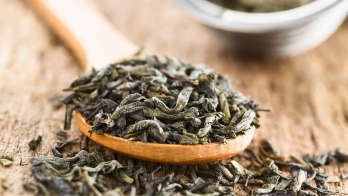Why green tea might extend your lifespan
The benefits of green tea have been praised for centuries, but does it really live up to the hype? Here’s what science says about green tea and its impact on longevity, inflammation, and chronic disease.

Whether you’re looking to reduce your risk of cardiovascular disease, improve blood sugar levels, or add years to your life, then green tea should be on your radar. Touted as one of the “healthiest” beverages on the planet, green tea consumption has been associated with several favorable effects on health. But does it really live up to the hype, and what does science have to say about its impact on chronic disease, inflammation, and lifespan?
Before diving into green tea’s impact on longevity, let’s discuss some of the science-backed benefits of green tea, how much you should drink each day, and what you should consider when buying a green tea product.

What is green tea?
Green tea comes from the plant Camellia sinensis, and is made from unfermented leaves that are pale in color and slightly bitter in flavor. It’s mainly produced in regions like China and Japan, and is commonly touted as a health-centric beverage due to it being rich in antioxidants and polyphenols [ 1 2
General benefits of green tea
Studies have shown that green tea consumption could have several favorable effects on your health, as it may reduce the risk of certain chronic diseases and even extend your lifespan. It also has a plethora of other benefits, including:
Added caffeine kick. Green tea contains an estimated 25 mg of caffeine/cup, which is about half the caffeine content in coffee. As such, this provides a boost of energy without any jitters.
Reduced bad breath. Studies have found that the catechins present in green tea may help suppress the growth of bacteria, which potentially lowers the risk of infections and reduces bad breath [
21
].Improved hydration. If you don’t like the taste of plain water, drinking green tea can help you reach your hydration goals.
Green tea vs. black tea
Drinking tea has multiple health benefits, but when it comes to deciding between green tea and black tea, how do you know which one is best? While both types of teas hail from the same plant, there are a few key differences when it comes to health and flavor.
Green tea: Freshly harvested tea leaves are immediately steamed to prevent fermentation and destroy enzymes that would otherwise break down the color pigments in the leaves, which allows the tea to maintain its green color [
2
]. This also helps to preserve the natural polyphenols in green tea, which contribute to many health-promoting properties.Black tea: Like green tea, black tea has a slew of health-promoting antioxidants and polyphenols. However, one key difference is that black tea is oxidized (while green tea is not), which results in dark brown tea leaves, heightened and intensified flavors, and slightly different types of flavonoids [
18
]. Additionally, black tea contains 50 mg of caffeine/cup, which is twice the caffeine content of green tea.

What’s the optimal amount of green tea?
The health benefits of green tea are shown at just 1 cup/day, but it’s believed to be safe when used up to 8 cups/day [ 10 12 19 20
However, research shows that consuming very high amounts of green tea (more than 8 cups/day for long periods of time) can be associated with liver injury, reduced blood levels, and lowered effectiveness of beta-blocker medication [ 2 10 14
Since green tea may interact with other medications, consult with your healthcare provider before taking high doses or certain products with green tea or green tea extract, especially if you have a history of liver disease or are currently taking beta-blockers.
How long should you steep green tea for health benefits?
The time and temperature at which you steep green tea can make a difference in both taste and health benefits. Generally, the best way to steep green tea is to use hot water (not boiling), pour it over the tea, and let the leaves steep for 2-3 minutes [ 8 8 9 13
When properly steeped, green tea releases more antioxidant-rich catechins to benefit health [ 9
Green tea and longevity
While there is no silver bullet to living a longer life, science has shown that long-term consumption of tea catechins can combat chronic disease, reduce oxidative stress, and potentially contribute to your healthspan [ 2 3 4 6 7
Reduced risk of heart disease.
Green tea may lower blood pressure and total and LDL (“bad”) cholesterol levels, all of which have been shown to reduce the risk of stroke and coronary heart disease [ 4 5 12
Green tea isn’t the only way to reduce LDL cholesterol. Here are the best science-backed strategies to
reduce your LDL cholesterol without medication
.
Possible decreased risk of cancer.
Studies of green tea intake and cancer diagnoses in people have produced inconsistent results. A study in China suggests that regular green tea consumption may reduce the risk of death from all-causes, cardiovascular disease and cancer, yet more research is needed to re-evaluate these associations in other populations [ 17 10
Better blood sugar control.
Green tea may improve insulin sensitivity, which can help reduce blood sugar levels, fasting glucose and HbA1c concentrations [ 7
Reduced inflammation.
EGCG (epigallocatechin-3-gallate), the main component in green tea, has been shown to have anti-inflammatory effects [ 8 2 8 2 15
Increased fat burning.
Studies have found that the catechins in green tea (like EGCG) may have anti-obesity and anti-diabetic effects, likely due to the effect on thermogenesis and increasing energy expenditure. Some research in mice has shown the EGCG from green tea may reduce obesity by increasing fat oxidation and decreasing energy absorption [ 2 16
Reduced risk of neurodegenerative disease.
Green tea may help improve brain function both in the short term and aging process, as the antioxidants and catechins in green tea contain various protective effects on neurons and may play a role in reducing cognitive deficits in individuals of advanced age [ 2 15 3 15
Nutrition can have a huge impact on your cognitive health. Here’s what dietitians have to say on which
foods are the worst (and best) for your brain
.

What to look for in a green tea product
There are many different types and varieties of green tea, and knowing what to look for may impact which one you choose. Here are some things to consider in a green tea product.
Convenience: If you’re looking for something quick and convenient, tea bags may be a good option.
Customized flavor: If you want to be able to adjust the strength and flavor of your tea, loose leaf options provide more flexibility and better quality.
Quality control: Look for products that have been quality tested.
Shelf life: Since the shelf life of green tea is between 6-12 months, be sure to check the date on the packaging, as fresher green teas are more likely to have higher antioxidant levels [
8
,9
,13
].Examine ingredients: Some teas may add pollen, honey, sweeteners or other flavorings. If you want pure green tea, choose an option that doesn’t have any additives.
Summary
Tea is the second-most commonly consumed beverage in the world, with green tea being widely known for its low caffeine levels and beneficial antioxidants. Green tea has several health benefits (ranging from improved cognition to reduced blood pressure) and has been shown to reduce oxidative stress, which is associated with better longevity and a reduced risk of chronic disease [ 2 11
Disclaimer: The text, images, videos, and other media on this page are provided for informational purposes only and are not intended to treat, diagnose or replace personalized medical care.
Key takeaways
Green tea consumption may have several favorable effects on health and longevity and may reduce the risk of certain chronic diseases, such as type 2 diabetes, coronary heart disease, obesity, and more.
Long-term consumption of tea catechins may be protective against common neurodegenerative conditions, such as Parkinson’s disease and Alzheimer’s disease.
Studies show that those who drink at least 5 cups of green tea per day are 76% less likely to die when compared to those who didn’t [
19
,20
].At high doses, green tea has been shown to reduce blood levels and the effectiveness of beta-blocker drugs used for high blood pressure and heart medicines. Consult your healthcare provider before taking high doses or certain products with green tea or green tea extract.
References:
McKay, D. L., & Blumberg, J. B. (2002). The role of tea in human health: an update. Journal of the American College of Nutrition, 21(1), 1–13. https://doi.org/10.1080/07315724.2002.10719187
Chacko, S. M., Thambi, P. T., Kuttan, R., & Nishigaki, I. (2010). Beneficial effects of green tea: a literature review. Chinese medicine, 5, 13. https://doi.org/10.1186/1749-8546-5-13
Caruana, M., & Vassallo, N. (2015). Tea Polyphenols in Parkinson's Disease. Advances in experimental medicine and biology, 863, 117–137. https://doi.org/10.1007/978-3-319-18365-7_6
Onakpoya, I., Spencer, E., Heneghan, C., & Thompson, M. (2014). The effect of green tea on blood pressure and lipid profile: a systematic review and meta-analysis of randomized clinical trials. Nutrition, metabolism, and cardiovascular diseases : NMCD, 24(8), 823–836. https://doi.org/10.1016/j.numecd.2014.01.016
Xu, R., Yang, K., Ding, J., & Chen, G. (2020). Effect of green tea supplementation on blood pressure: A systematic review and meta-analysis of randomized controlled trials. Medicine, 99(6), e19047. https://doi.org/10.1097/MD.0000000000019047
Babu, P. V., Sabitha, K. E., & Shyamaladevi, C. S. (2006). Therapeutic effect of green tea extract on oxidative stress in aorta and heart of streptozotocin diabetic rats. Chemico-biological interactions, 162(2), 114–120. https://doi.org/10.1016/j.cbi.2006.04.009
Liu, K., Zhou, R., Wang, B., Chen, K., Shi, L. Y., Zhu, J. D., & Mi, M. T. (2013). Effect of green tea on glucose control and insulin sensitivity: a meta-analysis of 17 randomized controlled trials. The American journal of clinical nutrition, 98(2), 340–348. https://doi.org/10.3945/ajcn.112.052746
Matthews C. M. (2010). Steep your genes in health: drink tea. Proceedings (Baylor University. Medical Center), 23(2), 142–144. https://www.ncbi.nlm.nih.gov/sites/ppmc/articles/PMC2848091/
Institute of Food Technologists (IFT). (2015, December 16). Steeping temperature and time may affect antioxidants in tea. ScienceDaily. Retrieved March 9, 2022 from www.sciencedaily.com/releases/2015/12/151216120154.htm
National Center for Complementary and Integrative Health. (2020, October). Green Tea. NCCIH. Retrieved March 8, 2022 from
https://www.nccih.nih.gov/health/green-tea
Pang, J., Zhang, Z., Zheng, T. Z., Bassig, B. A., Mao, C., Liu, X., Zhu, Y., Shi, K., Ge, J., Yang, Y. J., Dejia-Huang, Bai, M., & Peng, Y. (2016). Green tea consumption and risk of cardiovascular and ischemic related diseases: A meta-analysis. International journal of cardiology, 202, 967–974. https://doi.org/10.1016/j.ijcard.2014.12.176
Kuriyama, S., Shimazu, T., Ohmori, K., Kikuchi, N., Nakaya, N., Nishino, Y., Tsubono, Y., & Tsuji, I. (2006). Green tea consumption and mortality due to cardiovascular disease, cancer, and all causes in Japan: the Ohsaki study. JAMA, 296(10), 1255–1265. https://doi.org/10.1001/jama.296.10.1255
Boyers, L. (2022, January 18). The 8 Best Green Teas in 2022. The Spruce Eats. Retrieved March 6, 2022 from https://www.thespruceeats.com/best-green-tea-4843015
Ohishi, T., Goto, S., Monira, P., Isemura, M., & Nakamura, Y. (2016). Anti-inflammatory Action of Green Tea. Anti-inflammatory & anti-allergy agents in medicinal chemistry, 15(2), 74–90.
https://doi.org/10.2174/1871523015666160915154443
Weinreb, O., Mandel, S., Amit, T., & Youdim, M. B. (2004). Neurological mechanisms of green tea polyphenols in Alzheimer's and Parkinson's diseases. The Journal of nutritional biochemistry, 15(9), 506–516.
https://doi.org/10.1016/j.jnutbio.2004.05.002
Boschmann, M., & Thielecke, F. (2007). The effects of epigallocatechin-3-gallate on thermogenesis and fat oxidation in obese men: a pilot study. Journal of the American College of Nutrition, 26(4), 389S–395S.
https://doi.org/10.1080/07315724.2007.10719627
Liu, J., Liu, S., Zhou, H., Hanson, T., Yang, L., Chen, Z., & Zhou, M. (2016). Association of green tea consumption with mortality from all-cause, cardiovascular disease and cancer in a Chinese cohort of 165,000 adult men. European journal of epidemiology, 31(9), 853–865.
https://doi.org/10.1007/s10654-016-0173-3
Khan, N., & Mukhtar, H. (2013). Tea and health: studies in humans. Current pharmaceutical design, 19(34), 6141–6147.
https://doi.org/10.2174/1381612811319340008
Kuriyama, S., Shimazu, T., Ohmori, K., Kikuchi, N., Nakaya, N., Nishino, Y., Tsubono, Y., & Tsuji, I. (2006). Green tea consumption and mortality due to cardiovascular disease, cancer, and all causes in Japan: the Ohsaki study. JAMA, 296(10), 1255–1265.
https://doi.org/10.1001/jama.296.10.1255
Suzuki, E., Yorifuji, T., Takao, S., Komatsu, H., Sugiyama, M., Ohta, T., Ishikawa-Takata, K., & Doi, H. (2009). Green tea consumption and mortality among Japanese elderly people: The prospective Shizuoka elderly cohort. Annals of Epidemiology, 19(10), 732–739.
https://doi.org/10.1016/j.annepidem.2009.06.003
Lodhia, P., Yaegaki, K., Khakbaznejad, A., Imai, T., Sato, T., Tanaka, T., Murata, T., & Kamoda, T. (2008). Effect of green tea on volatile sulfur compounds in mouth air. Journal of nutritional science and vitaminology, 54(1), 89–94.
https://doi.org/10.3177/jnsv.54.89







